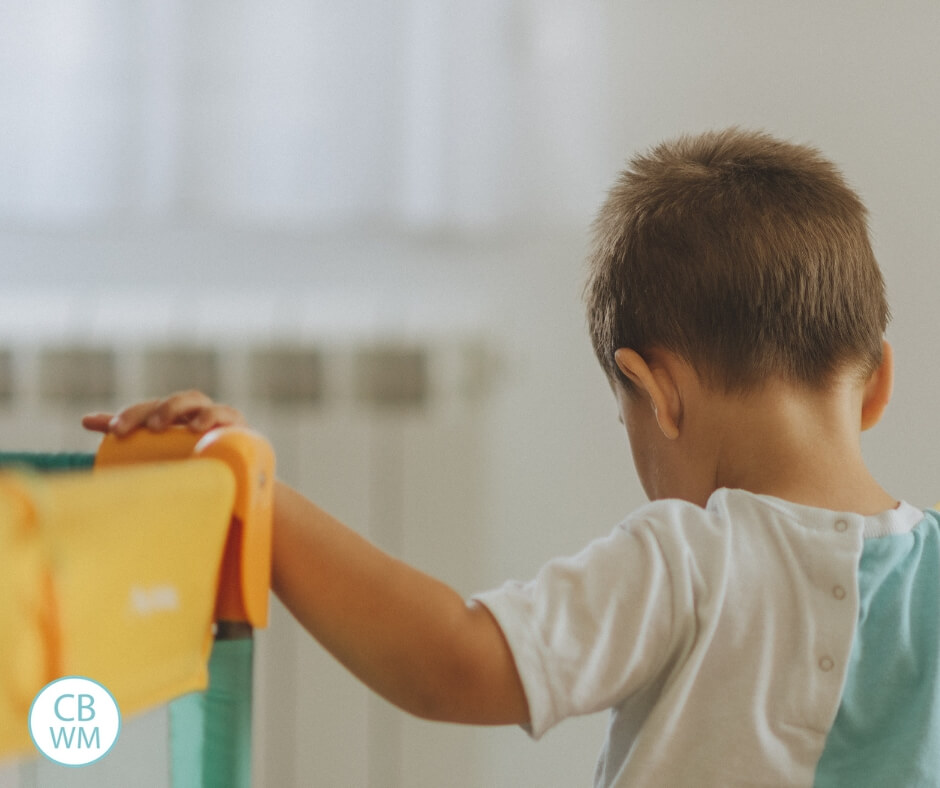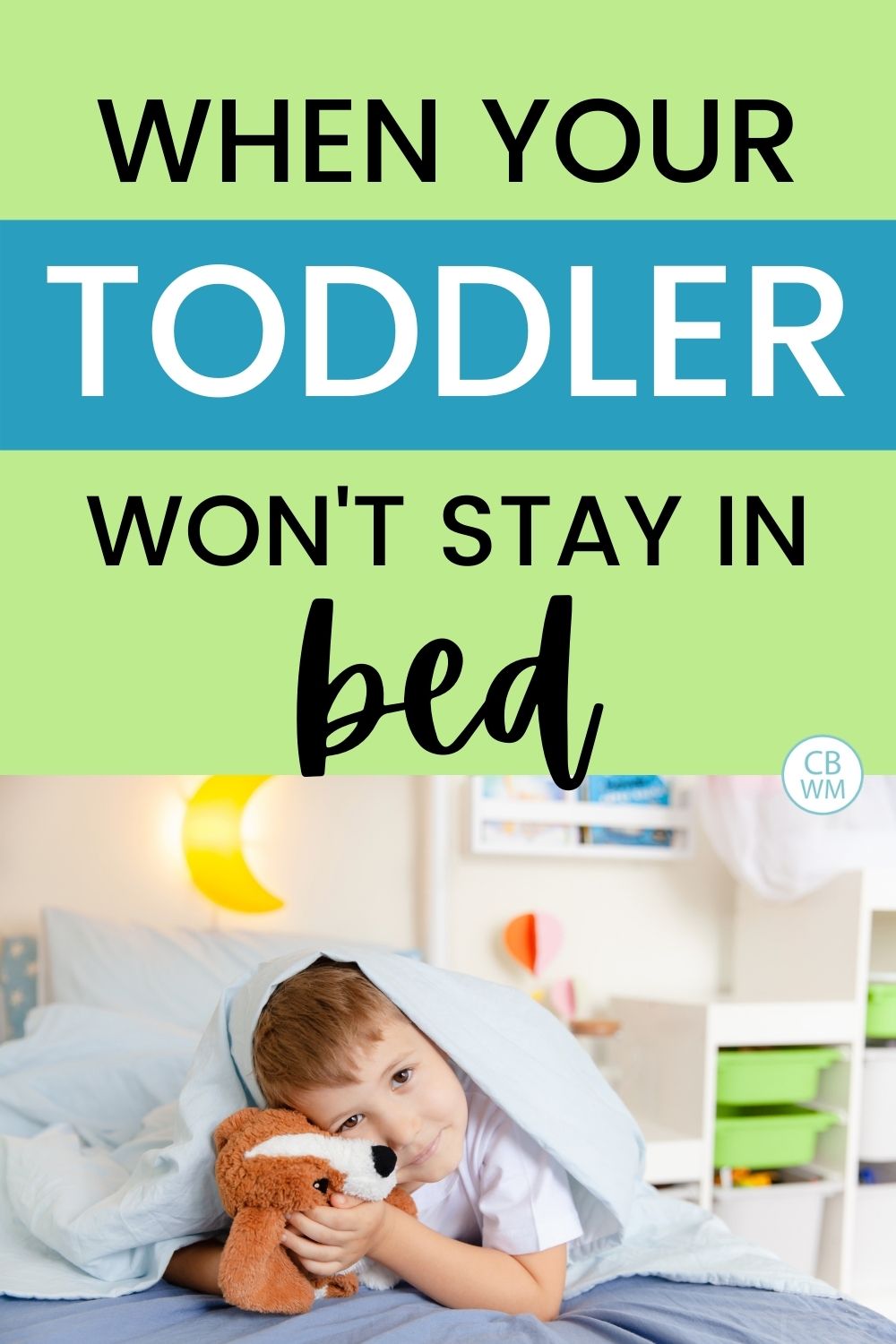What to do when your toddler is getting out of bed or your child is getting out of bed. Whether you have a toddler climbing out of crib or hopping out of bed, this post will help you.

When we moved Brayden from a crib to a twin bed, I worried that he would get out of it and the battle that would possibly follow.
Happily for us, he had no issues.
He was about 21 months old when we moved him from the crib to the bed.
We never had an issue with him getting out of bed until he was 3.5 years old.
Post Contents
- Getting Out of Bed to Go Potty
- What to Do When Your Toddler or Child is Getting Out of Bed
- Have Certain Privileges Contingent Upon Staying in Bed
- Reward for Staying in Bed
- Change The Daily Schedule
- Be Consistent In Response and Consequences
- Have a Solid Bedtime Routine
- Set Up a Restful Sleep Environment
- Remove Excuses
- Consider Sleep Regression
- Address Separation Anxiety
- Conclusion
- Related Posts
Getting Out of Bed to Go Potty
It started after he was potty trained.
A couple of weeks after I considered him to be potty trained (just over age three), I went to get him from a nap.
He was still asleep, but he had pooped in his underwear. I talked with him and told him if he needed to go potty, he could get out of bed and go.
A little light went off in his eyes. He had obviously never considered this a possibility of getting out of bed on his own before.
For a couple of days after that, he would come to me during his nap and tell me he had gone potty.
He was going only a small amount, and only so he could get out of bed.
My kiddo kept getting out of bed to go potty.
We then had another talk and I told him that he could go potty if he needed to, but that he couldn’t take advantage of that freedom and go potty whenever he wanted to get out of bed.
We talked about it until he understood. He was good after that and no longer took advantage of the situation.
But then when Brayden was about a month shy of 3.5–so a three year old), he again began to test the limits on this freedom.
He no longer used going potty as the excuse; he hunted for every excuse he could think of.
He needed a drink of water. I started to allow him to keep a sippy cup of water in his bed.
He would come to me with question after question.
He wondered what time he could get out of bed. I taught him how to tell time and what time was acceptable to get up.
At first, that worked fine, but then he would just sit and stare at the clock instead of sleep at all.
He went to taking maybe one nap a week. He would not sleep. He was tired.
Something had to be done.

What to Do When Your Toddler or Child is Getting Out of Bed
It is important for you to note that your child will most likely test the boundary of staying in bed at some point. Kids love to test boundaries, and this one is no different.
Here are some tips for parents who are facing this situation.
Have Certain Privileges Contingent Upon Staying in Bed
One thing I did was move certain privileges to after nap time, and those were conditional upon him staying in bed.
For him, this was TV time. He didn’t get TV time unless he stayed in bed for his nap.
That worked for a while, but he again started to come up with new excuses to get out of bed.
A big part of this I knew was a result of my being so sick for my first trimester of pregnancy (pregnant with my third baby).
He had more freedom during that time (as is common when mom is pregnant) and had started to become ‘wise in his own eyes.‘ There was some retraining that needed to happen here.
Reward for Staying in Bed
I tried rewarding him for taking a nap rather than simply punishing him for getting out of bed. That didn’t seem to make any impact on him.
That does not mean, however, that it will not work to keep your toddler in bed. Give rewards a try and see if it works for your child’s personality.
You might find something as simple as putting a sticker on a sticker chart each time she stays in bed to be motivating enough.
If consequences do not work for your child, then a positive reward system, like a sticker chart, might be a good solution for you.
You can let your child add a sticker to the chart each day he did not get out of bed. The reward chart can work toward a bigger goal, like a special treat, movie, or outing.
Change The Daily Schedule
Sometimes sleep issues like this come up because there needs to be a change to the daily schedule in some way.
You might need to shorten the nap, drop the nap, or change what time you have bedtime.
You might need to have your toddler, preschooler, or child do more physical activities in the day to be tired enough to go to sleep.
The same can be true for being mentally stimulated enough for sleep. Some learning activities each day can solve that.
>>>Read: How To Do a Learning Activity of the Day
I started to wonder if Brayden was ready for rest time rather than naptime.
He didn’t misbehave the days he didn’t take a nap (other than not staying in bed).
For whatever reason, I just didn’t think he was ready for full rest time. I knew he didn’t need a nap every day, but he also wasn’t ready for the expectation of a nap or two a week.
>>>Read: How to Do Rest Time {Instead of Naps}
Be Consistent In Response and Consequences
As you try out different ways to solve your kiddo getting out of bed at night or in the day, you need to be consistent in how you respond and what the consequences are for doing so.
Do not give in to fits if and when then erupt when you give consequences.
Consistency always pays off.
Over time, we re-established proper freedoms for Brayden’s age. We also had one pivotal day where I finally found the currency that worked for him.
I told him if he got out of bed, I was going to take his clock away. Well, he did, and so I did. He was very upset about this and started to cry. I told him he had made his decision. He cried for about thirty minutes before he finally just fell asleep.
From that day forward, he has stayed in his bed flawlessly. A month later, he was once again taking naps most days of the week instead of just one day a week.
He had his clock back and wanted to keep it that way.
As your child gets out of bed over and over, think about exactly how you want to respond. It is wise to stay calm and non-emotional.
If you do take your child back to bed, do so quickly and without frills. Don’t read another bedtime story. Don’t give a million kisses. Don’t repeat your routine. You already did all of that.
Do not make this fun for your child.
Some find good success by not putting their child back in bed. If the child gets out, he has to put himself back to bed, but that won’t always work, especially with younger toddlers.
Have a Solid Bedtime Routine
If your toddler keeps getting out of bed, consider your bedtime routine. Make sure your routine will soothe your kiddo and help him settle down for sleep.
Avoid rough play before bed and limit screen time for about an hour before bedtime. Blue light from screens is known to mess with circadian rhythm and make it so people can’t fall asleep.
Be sure you have a consistent routine that helps your child wind down.
Set Up a Restful Sleep Environment
Have a good sleep environment for your child. Some elements to consider include:
- sleep in own bed
- lights dim (or even blackout curtains)
- naps should be in own room (not with other people in the room)
- a sound machine can help a toddler sleep better. The sound machine helps drown out any enticing noises that might draw your little one out of bed.
- Shut the bedroom door to help block out noise.
Some children might do well if they are allowed to have a book, or even a few books, to look at in bed.
If your child is still in a crib, you might consider moving to a toddler bed or twin bed. Sometimes being in a bed is more comfortable than a crib.
Sometimes moving to a twin bed instead of a toddler bed will keep your kiddo in bed since the bed is so much higher off the ground.
You could also try some bedrails on the bed. Sometimes seeing a phyiscal barrier there will help remind the child to stay put.
Along the same line of thinking, if you have the door open, try closing the door for sleep (this is actually the safer way to sleep in case of fire). Some parents use a baby gate instead.
Remove Excuses
As you find your child coming out of his room with excuses, work to remove those excuses.
Is your child constantly thirsty? Keep a cup of water by the bed.
Is your child constantly scared of the dark? Get a night light.
>>>Read: What To Do When Your Child is Scared of the Dark
If your kiddo wants to know if it is time yet, teach your child to read time or get an Okay to Wake Clock.
Always needing to go potty? Make sure potty happens before nap, but even so, there will be times your child will need to go potty before nap or bed. You might allow for going once after being put to bed or might even put a potty in the room with your kiddo and have him call to you if he actually uses it.
Consider Sleep Regression
By now, you know sleep regressions are a real thing. Your kiddo might be struggling to fall asleep because of a sleep regression and then coming to visit you.
>>>Read: How To Deal with the 2 Year Old Sleep Regression
Address Separation Anxiety
Your kiddo could be getting out of bed because of some sort of anxiety. If that is happening, be sure to talk with your child about it and address it.
The best time to talk about it is NOT when it is time for bed. If real worries are happening, you will want to take the time to talk about it when you are not trying to get your child back in bed and your child is trying to stay out of it.
Conclusion
If you have a toddler getting getting out of bed, or a preschooler or child getting out of bed, hopefully this story can help you with problem solving.
The first thing to consider is your child’s freedom level. He probably is being allowed more freedom than he can handle during the day. Children need to be reminded at times that they are kids, not parents.
Then, search out proper rewards/consequences for his actions.
Fortunately, we didn’t have issues with night sleep at this age. If you do, the same ideas can apply.
These tips can help you with naps and night sleep to get your child staying in bed when it is time to sleep. Good luck!
Related Posts
- Transitioning from a Crib to a Bed
- How to Know What Freedoms to Give
- What To Do When Your Child is Playing in the Crib/Bed Instead of Sleeping
- What to Do When Your Toddler Refuses to Take a Nap
- How to Help Preschoolers Work Through Their Fears
- 2 Year Old Sleep Problems – How To Solve Them!
- What to Do When Your Toddler Cries at Nap Time
- Solve Sleep Problems for Toddlers and Preschoolers
This post originally appeared on this blog December 2008


